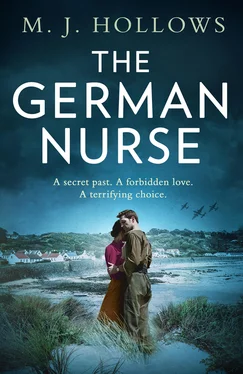A couple of his colleagues were manoeuvring a wooden barricade into place along the end of the pier. One of them, an older man, PC Frank Baker, was struggling to lift the crossbeam into the groove cut in a leg, and Jack rushed to help him. ‘Thanks,’ Frank said as they wrestled the beam into place, and he stopped to wipe the sweat from his brow. ‘This probably won’t help much if this lot get rowdy.’ He threw a thumb over his shoulder in the direction of the growing queue. ‘But at least it will make them think twice.’
A man walked past them, carrying three overfilled rucksacks and visibly sweating in the heat. ‘There’s no way he’s getting that lot on a boat,’ Jack said, looking over at his other colleague, Sergeant Honfleur, who nodded and grumbled.
‘Glad you could join us, Godwin. You can man this barricade while we take a break.’
There was a loud crack as a wooden crate was dropped to the ground by two khaki-clad soldiers. Neither of them flinched. The navy’s boats bobbed gently in their moorings as the materiel was taken on board. That both the army and the children were being evacuated at the same time was causing havoc with the harbour, and the men in khaki moved freely past the cordons the police had set up. Jack could see some of the civilians edging closer, looking to take advantage of the lapse.
A soldier with three chevrons stitched on to his sleeve stopped, put down a crate and used the break to stretch his back. He looked over at Jack and nodded. ‘Good thing the weather is calm,’ he said, his accent not from the islands. ‘Or the trip to the mainland with this lot would be hell.’
‘That’s true, but they’ll want to hurry up. They’re getting in the way of the evacuation.’
The sergeant nodded. ‘Aye, but it’s not easy mobilising an army, my friend. Especially across the sea. We’ve got a lot to get on board that there navy ship out in the bay.’
‘They must have known this was coming. You could at least leave us something.’
‘Hah, don’t assume anything. We were caught napping during the last war too. Chamberlain didn’t fancy a fight, but now ol’ Churchill’s in charge. And no can do, friend.’ He patted the crate he had been carrying. ‘Can’t leave anything behind that we may need. It’s for your own good. If the Hun do come, you’ll be best off if they think you’re completely unarmed. I know it’s not easy to hear, but that’s how it is.’
‘You’re still abandoning us.’
The other man was silent for a moment, looking out over the sea. He nodded shallowly, before speaking. ‘I can see why you would think that,’ he said. ‘Truth is, I reckon it’s a question of winning or losing the war altogether. If the Germans come here, what can we do to stop them really?’ He waved a hand around the harbour. ‘We could defend bits of the island, but with no navy support we’d soon be overrun. Me and my lads can be put to better use somewhere else.
‘And if we’re not here, at least they won’t come with force. No one will die for a few extra days’ resistance.’
Jack scowled. This man had no choice but to go off and fight somewhere else, but Jack didn’t have to like it. While there was still some hope, they could stop the Germans taking the island.
The other man’s frown broke into a smile. ‘Say what. Come with us. Young lad like you’d do well in khaki.’
Jack shook his head. What else could he say? That he hated war? He surely wouldn’t appreciate it. Besides, that was an overly simplistic explanation. It wasn’t war that he hated; it was death. Jack had lost everything as a child, and he had always blamed war for it.
‘I can’t. My family … I’m needed here,’ he said. He would never forgive himself if he left his family to fend for themselves, and he knew that no matter what he said they would never leave the island. This was their home. This was his home.
‘I understand,’ the other man said, lighting a cigarette and offering the packet to Jack who refused. ‘More than you can imagine. It’s why I do what I do. Some of us don’t have families to look after. Some of us fight to protect other people’s families, those who have what we don’t.’ He took a long drag. ‘I don’t blame you for staying. I’d probably do the same if it was my home and I had anyone to stay for. I wish you luck.’ With a grunt he lifted the crate up and trudged off down the pier, cigarette hanging out of the corner of his mouth.
‘Thanks.’
A boat was pushing off from the harbour, wobbling as a soldier kicked at the mooring. When the boat moved suddenly, he almost fell but was caught by a companion. They laughed it off, but the boat was so overcrowded Jack didn’t fancy their chances of staying dry during the journey. There weren’t enough boats to take them all out to the SS Biarritz in the bay. Jack wondered if he did want to go with them after all, where would he even fit?
A few hours later, Jack watched the last of the boats leave the harbour. The Biarritz was already disappearing around the corner of the bay, the smoke from its chimneys the only blotch on the clear blue sky. There were still some fishing boats moored up in the harbour, but it was a shadow of its former self. The island felt quieter already, except for the soft sobbing coming from behind him as families went home to await their unknown future.
‘ À bétaot, ’ he said to no one in particular. Goodbye .
The windows of the house rattled to an irregular rhythm in their frames. At first they had thought a truck from one of the farms had driven too close to the house, but the sound had continued. There would be a long moment of calm, followed by the glass shaking a few times in quick succession. Some were quieter than others, then a large bang drifted across the sea as something bigger went up.
The crockery on his tray clinked with each movement as Jack carried bowls of potato soup to his grandparents, trying not to spill any on the floor. He had expected them to look concerned when he entered their room, but they sat up against the metal headboard of their bed, quietly muttering to themselves.
‘I hear the Hun are at it again,’ his grandfather grumbled as he spotted Jack, who was too busy concentrating on the bowls to reply.
‘Thank you, dear,’ his grandmother said as he put the tray down on the only table in their room, a dark-lacquered, old wooden side table. He passed a bowl to her. She lifted the spoon and moved it towards her husband, who scoffed when he saw what she was doing. ‘I’m not an invalid,’ he said, before a cough racked his body. She smiled wearily at him, but Jack knew that she would do anything for her husband. As he would do for Johanna.
He picked up the second bowl and there was another rumble from outside. Jack flinched as it rocked in his hands.
‘Don’t worry, Jacky,’ his grandmother said, and Jack was unsure whether she was talking about the soup or the sound of warfare drifting in through the open window. ‘You’ll get used to it, just like we did in the last war.’
Jack wondered if this would be the same, that at some point the backdrop of war would become second nature to them.
‘The Hun wouldn’t dare,’ his grandfather agreed, before another coughing fit. Jack wanted to do something to help him, the man who had been like a father to him in the absence of his own father, but nothing they had done had helped. Jack longed for the grandfather who had told him stories of better times and convinced him to join the police force, knowing that he could never do anything else but try to help people, that since his father had died Jack had wanted to prevent anyone else suffering the same heartbreak. His grandfather was the man who had helped Jack feel like a local, forget that he was born in England and fit in on the island. It was funny to think that all those things had led him to become a policeman.
Читать дальше












